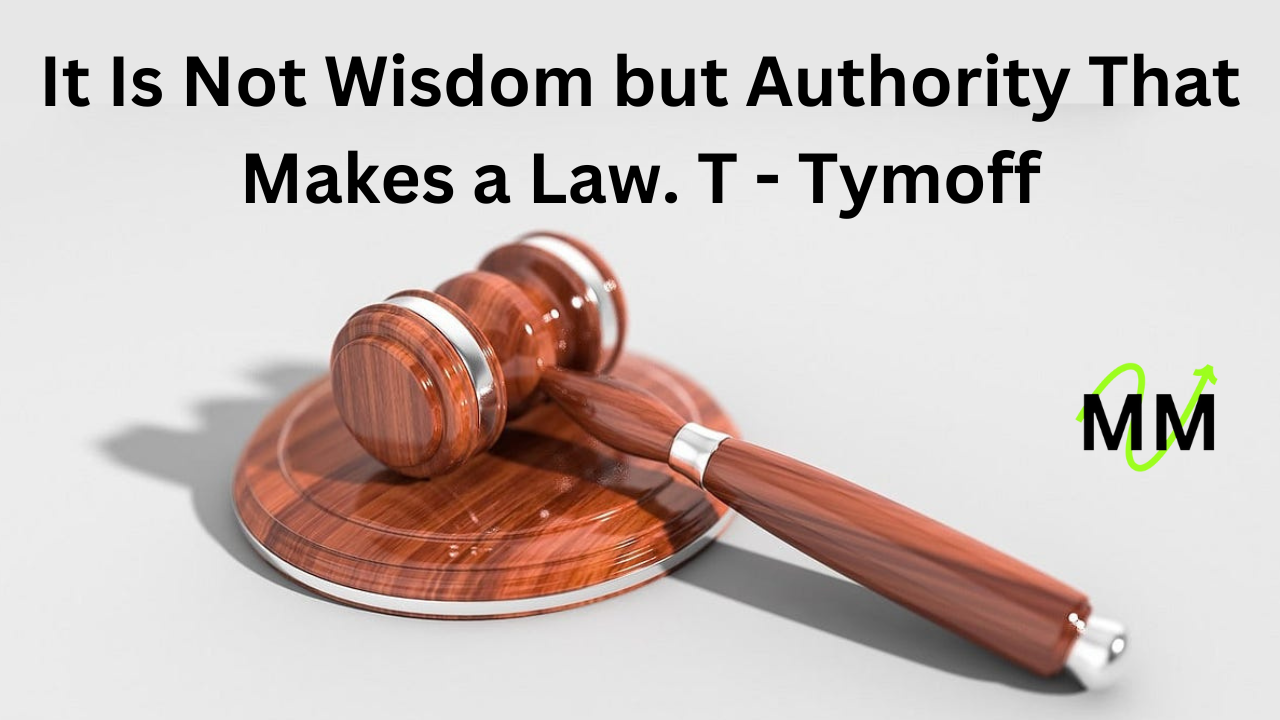It Is Not Wisdom but Authority That Makes a Law. T – Tymoff

Laws have been the foundation of civilizations for millennia, providing structure and order to societies. The statement It Is Not Wisdom but Authority That Makes a Law. T – Tymoff raises an intriguing perspective on the nature of legal systems and the forces that shape them. This article delves into the complex interplay between authority and wisdom in creating laws, exploring historical examples, the role of power, and the implications for contemporary society.
The Nature of Law and Authority
Laws are the codified norms and rules that govern behaviour within a society. They are established to maintain order, protect rights, and promote the common good. However, the process by which laws are made often reflects a society’s authority and power structures rather than pure wisdom or ethical considerations.
In this context, authority refers to the power or right to give orders, make decisions, and enforce obedience. It is vested in institutions such as governments, monarchies, or religious bodies. This authority can stem from various sources, including tradition, coercion, or democratic consent.
Historical Perspectives on Lawmaking
Ancient Civilizations
In ancient civilizations, such as those of Mesopotamia and Egypt, laws were often attributed to divine or royal authority. The Code of Hammurabi, one of the oldest known legal codes, was presented as a set of laws given by the Babylonian god Marduk to King Hammurabi. This divine endorsement legitimized the ruler’s authority and ensured compliance with the laws.
Similarly, in ancient Egypt, pharaohs were seen as living gods whose decrees were absolute. Their authority was unquestionable, and their laws were considered infallible due to their divine nature. In these contexts, wisdom was secondary to the unquestioned authority of the rulers.
The Roman Empire
The Roman Empire provides another fascinating example of the tension between authority and wisdom in lawmaking. The rule of the Senate and the Emperor heavily influenced Roman law. While the Romans valued wisdom and legal scholarship, the ultimate power to create and enforce laws rested with those in positions of authority.
The Twelve Tables, one of the earliest codifications of Roman law, were created in response to the plebeians’ demands for transparency and fairness. Despite this push for wisdom and equity, the laws were still ultimately enacted by those in power, reflecting the authority of the ruling class.
The Role of Authority in Modern Legal Systems
Democratic Societies
In modern democratic societies, creating laws ostensibly involves balancing authority and wisdom—the elected representatives ideally craft laws based on the needs and knowledge of their constituents. However, reality often reveals a more complex interplay of power dynamics.
Lobbying, political parties, and interest groups significantly influence the legislative process. This can result in laws that reflect the interests of the powerful rather than society’s collective wisdom. While democratic systems aim to incorporate wisdom through public participation and debate, authority still plays a crucial role in determining which laws are enacted.
Authoritarian Regimes
In contrast, authoritarian regimes epitomize that authority, not wisdom, is the primary driver of lawmaking. In such systems, laws are often used as tools of control and repression, reflecting the will of a single ruler or a dominant party. The wisdom or ethical considerations of the laws are secondary to their utility in maintaining power.
For example, in North Korea, laws are crafted to reinforce the absolute authority of the ruling Kim family. The legal system serves the regime’s interests with little regard for individual rights or broader ethical considerations. This starkly illustrates Tymoff’s assertion that authority, rather than wisdom, is the foundation of law in specific contexts.
Read More
The Implications of Authority-Driven Lawmaking
Justice and Fairness
When laws are driven primarily by authority rather than wisdom, issues of justice and fairness often arise. Laws enacted by powerful authorities can disproportionately benefit those in power and marginalize vulnerable populations. This can lead to systemic inequalities and social unrest.
For instance, Jim Crow laws in the United States were created by those in authority to maintain racial segregation and disenfranchise African Americans. These laws were not based on wisdom or ethical considerations but were designed to uphold the power structure of white supremacy. The long-term consequences of such authority-driven laws included widespread discrimination and social inequality.
Adaptability and Progress
Another significant implication of authority-driven lawmaking is the potential for rigidity and resistance to change. When laws are rooted in the authority of a specific regime or ruling class, they may become entrenched and resistant to reform, hindering societal progress and adaptability.
In contrast, laws that incorporate wisdom and are responsive to societal needs and ethical considerations are more likely to evolve and adapt over time. Such laws can better address emerging challenges and promote long-term social well-being.
Balancing Authority and Wisdom in Lawmaking
The Role of Legal Institutions
Striking a balance between authority and wisdom is crucial to creating just and effective laws. Legal institutions, such as courts and regulatory bodies, play a vital role in mediating this balance. Independent judiciaries can review and interpret laws, ensuring they align with broader principles of justice and fairness.
For example, the United States Supreme Court has the authority to strike down laws that it deems unconstitutional, providing a check on legislative and executive power. This judicial review process incorporates wisdom and ethical considerations into the legal system.
Public Participation and Transparency
Enhancing public participation and transparency in lawmaking can also help balance authority and wisdom. When citizens are actively involved in the legislative process, their collective knowledge and diverse perspectives can inform the creation of more equitable and effective laws.
Public consultations, referendums, and open legislative sessions can increase transparency and accountability. By involving a broader segment of society in the lawmaking process, democratic systems can better reflect the collective wisdom of their populations.
Read More
Conclusion
The statement It Is Not Wisdom but Authority That Makes a Law. T – Tymoff highlights a fundamental truth about the nature of legal systems. While wisdom and ethical considerations are essential to just and effective laws, the authority to create and enforce laws ultimately shapes their content and implementation. Understanding this dynamic is crucial for developing legal systems that promote justice, fairness, and societal well-being. By striving to balance authority and wisdom in the lawmaking process, societies can create laws that serve the common good and adapt to the evolving needs of their populations.






